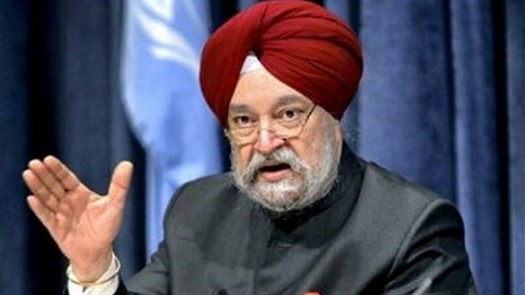
India's crude import
diversification will come to the rescue if tensions in the Middle East escalate
and create supply hurdles, but triple-digit oil prices would move consumers
further away from fossil fuels and
accelerate the energy transition process, Petroleum Minister Hardeep Singh Puri
said.
He said India was keeping a close eye on the ongoing conflict in the
Middle East, and there was no immediate threat to supplies. "The place
where all the events are taking place is in many respects the center of the
global energy industry. So, we will watch very carefully. And as we go along,
we will navigate our way through this," he told reporters.
Violence between Israel and Hamas
militants continues to dominate sentiment in the crude oil market, with the conflict
clouding the supply outlook from the Middle East. But as the conflict was into
its sixth day without drawing in other regional powers, namely Iran, the market
appears to be discounting fears of a significant energy impact.
"Today, the
world that you are facing is not a world which is characterized by shortage of
crude. I mean the amount of crude oil that is required to sustain the current
level of consumption, which is about 100 million-102 million b/d is available.
But some 5 million b/d has been taken off the market. So that's the
issue," the minister said.
Since Russia's
invasion of Ukraine in February 2022, Indian refiners have been taking
advantage of discounted Russian oil. Moscow has become India's top source of
crude oil in 2023. Russian crude flows reached 1.8 million b/d over
January-September, accounting for 38 per cent of India's total oil imports,
rising from 11.2% during the same period in 2022, according to S&P Global.
As a result, the share of Middle Eastern crude decreased from 63%, or 2.9
million b/d, over January-September 2022 to 45%, or 2.1 million b/d, over
January-September this year.
Crude oil imports
from Russia declined in August and September compared with the second quarter
of 2023 due to refinery maintenance and turnaround activities at some
refineries. But despite these
fluctuations, Russian imports still constituted over 35 percent of India's
total imports, the highest share from a single country.
Russian crude has
primarily displaced Middle Eastern barrels, followed by West African crude, in
Indian refineries.
" Puri said
geopolitical uncertainties, including the Russia-Ukraine conflict, would
expedite the process of energy transition in favor of sustainable and cleaner
fuel sources and away from fossil fuels.